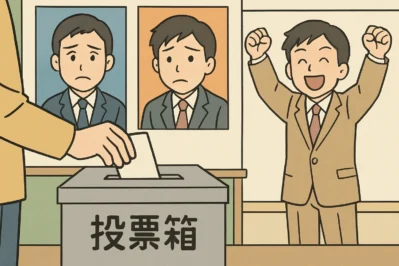Master Korean Election Lingo Now!
Hello! Welcome to Maeil Hangul, here to upgrade your Korean skills!
Ever turn on the Korean news and see intense debates and crowds of people cheering? Or maybe you’ve seen election scenes in your favorite K-drama? Today, we’re diving into the exciting world of Korean politics by learning how to talk about the election process.
With elections being a hot topic in Korea and around the globe, knowing these words will help you understand the news, follow political dramas, and even chat with your Korean friends about current events. Let’s get started!
Core Expressions You Need to Know
Here are the essential words to navigate any conversation about Korean elections.
- 1. 선거 (Seon-geo)
- Pronunciation [Romanization]: Seon-geo
- English Meaning: Election
- Detailed Explanation: This is the general term for any election, from choosing a class president (학급 회장 선거) to the presidential election (대통령 선거, often shortened to 대선). It’s a fundamental noun you’ll see and hear everywhere during election season.
- 2. 후보자 (Hu-bo-ja)
- Pronunciation [Romanization]: Hu-bo-ja
- English Meaning: Candidate
- Detailed Explanation: This word refers to a person running for office. It’s composed of ‘후보’ (hubo), meaning candidacy, and ‘자’ (ja), a Hanja character meaning ‘person’. So, it literally means “candidate person.” You’ll often see their faces on posters all over the streets during the campaign period.
- 3. 투표하다 (Tu-pyo-hada)
- Pronunciation [Romanization]: Tu-pyo-ha-da
- English Meaning: To vote
- Detailed Explanation: This is the most important action verb! ‘투표’ (tupyo) is the noun for “vote” or “ballot,” and ‘하다’ (hada) is the verb “to do.” Together, they mean “to vote.” You can say “투표했어요” (tupyo-haesseoyo) for “I voted.”
- 4. 당선되다 (Dang-seon-doeda)
- Pronunciation [Romanization]: Dang-seon-doe-da
- English Meaning: To be elected
- Detailed Explanation: This is what every candidate dreams of! ‘당선’ (dangseon) means ‘election victory’, and ‘되다’ (doeda) is a passive verb, meaning ‘to become’. So, the phrase means “to become elected.” If a candidate wins, the news will announce that they “당선되었어요” (dangseon-doeeosseoyo).
Example Dialogue
Let’s see how these words are used in a natural conversation.
A: 이번 선거에 관심 있어?
(I-beon seon-geo-e gwan-sim iss-eo?)
(Are you interested in the upcoming election?)
B: 응, 어떤 후보자를 뽑을지 고민 중이야. 공약이 다 다르네.
(Eung, eo-tteon hu-bo-ja-reul ppo-beul-ji go-min jung-i-ya. Gong-yak-i da da-reu-ne.)
(Yeah, I’m thinking about which candidate to choose. Their pledges are all so different.)
A: 맞아. 나는 꼭 투표할 거야. 우리의 권리니까.
(Maj-a. Na-neun kkok tu-pyo-hal geo-ya. U-ri-ui gwon-ri-ni-kka.)
(Right. I’m definitely going to vote. It’s our right.)
B: 나도. 과연 누가 당선될까? 정말 궁금하다.
(Na-do. Gwa-yeon nu-ga dang-seon-doel-kka? Jeong-mal gung-geum-ha-da.)
(Me too. I really wonder who will be elected. I’m so curious.)
Culture Tip & Trend Deep Dive
The Sights and Sounds of Korean Elections!
You haven’t truly experienced a Korean election until you’ve seen the campaign trucks! In Korea, campaigning is a very lively and public affair. Candidates ride in trucks equipped with huge screens and speakers, blasting their unique “logo songs” (선거송 – seon-geo-song). These songs are often catchy remixes of famous K-pop hits with new, election-themed lyrics!
You’ll also see candidates and their teams bowing deeply to pedestrians at busy intersections for weeks, asking for their vote. It’s a sign of respect and earnestness. So if you see this, you’ll know exactly what’s happening—it’s 선거 season! Knowing this will make you look like a true Korea expert.
Wrap-up & Practice Time!
Great job today! You’ve learned four essential words to discuss the Korean election process: 선거 (election), 후보자 (candidate), 투표하다 (to vote), and 당선되다 (to be elected). You’re now ready to understand the news and chat about this important topic!
Let’s test your knowledge! Fill in the blanks with the correct word from today’s lesson.
- A person running for president is a 대통령 _______. (daetongnyeong _______.)
- On election day, I will go to _______. (_______하러 갈 거예요.)
Leave your answers and try making your own sentence in the comments below. We’d love to see them! Happy learning






